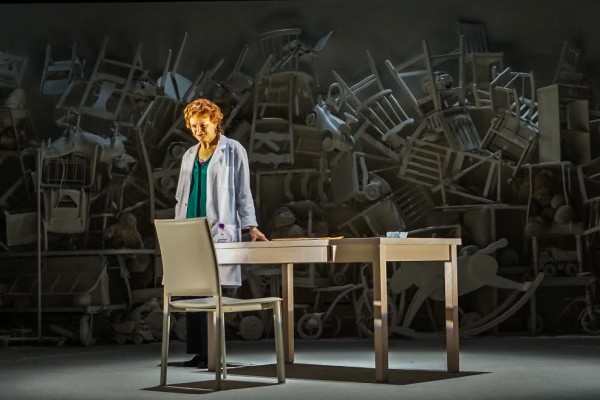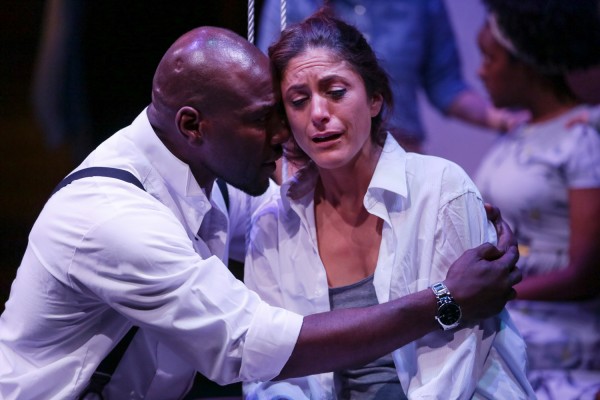Two local theater productions, one a world premiere, examine the fraught relationships between adults and kids…

Roz and Ray at Seattle Repertory Theatre. Ellen McLaughlin as Dr Roz Kagen. Photo by Alabastro Photography.
Review: Roz and Ray by Karen Hartman. Produced by Seattle Repertory Theatre. Directed by Chay Yew. Scenic Design by Tim Mackabee. Costume Design by Rose Pederson. Lighting Design by Geoff Korff. Composer and Sound Design by Christopher Kriz. With Ellen McLaughlin and Teagle F. Bougere. Now through November 13, 2016 at Seattle Rep.
First up, Seattle Rep’s premiere of a locally written play they helped develop. It’s Karen Hartman’s two hander, ROZ AND RAY which centers on the problematic relationship between a doctor and the father of children she is treating. Dr. Roz is a compassionate, driven doctor working at San Diego Children’s Hospital who specializes in caring for young hemophiliac patients. Hemophilia is a genetic disorder where blood fails to adequately clot; when a hemophiliac suffers a surface skin cut or even a strong enough blow to cause bruising or internal bleeding, they can quickly bleed to death. Inherited hemophilia is passed to males; before effective treatments, few of them lived to see 20.
Ray is the single father of twin sons, both hemophiliacs. The mother skipped out early on, unable to cope with the situation and Ray struggles to raise his sons and deal with their complicated medical treatment as well as struggling with his own personal issues as well. The play begins in the late 1970s as new treatments emerge to treat hemophiliacs. Ray is originally a bit skeptical but the new treatments are successful and Ray is impressed by Roz’s compassion and dedication to treating his sons and going behind the call of duty in her practice. But, the advent of the AIDS crisis is devastating to the hemophiliac community. Big pharm, the medical industry and the government were slow to react and as a result, thousands of young hemophiliacs were exposed to the AIDS virus and many died. When tragedy strikes Ray’s family, he places blame on Dr. Roz. The play flashes back and forth through roughly a 15 year period between the late 70s and the play’s most recent present (circa 1992) and charts the ebb and flow of the relationship between the pair, the only two characters onstage in this play.
Roz and Ray examines a fascinating albeit heartbreaking subject, the lives of hemophilia patients and treatment during the AIDS epidemic and frankly, it’s this fact based and well researched story that is the best part of this play. Ms Hartman is the daughter of a doctor who treated such patients at that time so it’s a world she has familiarity with and as a result, the play is at its most riveting when it deals with the factual elements of this story. She’s also created two vibrant interesting characters in Roz and Ray; they’re passionate and compelling people.
But, the play is at its weakest with certain plot elements introduced. It’s hard to write about these elements without “spoiling” the story but they’re key to the play’s structure and in my opinion, they cripple it. The playwright takes exacting pains to quickly establish the personalities of both characters so when plot devices are used that seem to contradict those established characters, it just rings false and cliche. This play doesn’t need that kind of soap opera theatrics. So, Roz and Ray’s relatively brief physical relationship just seems contrived and unnatural. So does Ray’s reaction to tragic events in his life as does certain acts that Ray commits late in the play; they seem like something out of bad television plotting. The overly long winded final scene just doesn’t do the characters and the fascinating medical drama plot, any justice.
All that said, Roz and Ray is still quite compelling. Both actors are in excellent form with superb work from Teagle F. Bougere and the always fascinating Ellen McLaughlin. Chay Yew’s astute staging of the actors is aided by a clever revolving set from Tim Mackabee that also included a brilliant backdrop of white painted children’s furniture and toys. It’s a handsome production and one that would be of considerable interest to anyone invested into seeing different stories told about the AIDS crisis.
But, they really need to dump the “All My Children” melodrama to lift this play up to a higher level of drama. It doesn’t need to stoop to bad TV tropes to engage us. It’s disrespectful to the characters and the audience.

Sylvester Foday Kamara and Alex Tavares in Seattle Shakespeare Company’s production of MEDEA. Photo by John Ulman.
Review: Medea by Euripides. Translation by Kenneth McLeish and Frederick Raphael. Original Music by Shenandoah Davis. Produced by Seattle Shakespeare Company. Directed by Kelly Kitchens. Choreography by Donald Byrd. Set Design by Andrea Bryn Bush. Costume Design by Chelsea Cook. Lighting Design by Kent Cubbage. Sound Design by Jay Weinland. Properties Design by Robin Macartney. With John Bianchi, Maya Burton, Peter Crook, Cecilia Cruz, Yadira Duarte, Sunam Ellis, Sylvester Foday Kamara, Chelsea LeValley, Kevin McKeon, Matt Sherrill, Alexandra Tavares, Kathryn Van Meter, Lucy Weber, Dedra D. Woods. Now through November 13, 2016 at Center Theatre at Seattle Center.
To continue our theme of “Children in Danger” we move across the Seattle Center campus to the Center Theatre where Seattle Shakespeare Company is doing their annual “lets step away from doing Shakespeare because even we need a Bard Break” production and this time it’s Euripdes’ classic Greek tragedy MEDEA about the enraged wife who offs her kids to get back at her asshole husband when he announces he’s dumping her to marry a princess.
Yes, I forgot to put in my “Spoiler Alert” but if you’re unaware of the central plot of Medea, you have no business seeing theater or even leaving the house because you’re hopeless.
Medea is a juicy play with a juicy role and theater companies and actresses love sinking their teeth into it. It features fierce women, bloody revenge and dead children, so what’s not to love? This production also decides to up the ante by placing it in more contemporary context; it’s modern dress and the stylish set by Andrea Byrn Bush looks like it stepped out of a recent issue of Architectural Digest. Medea and her hubby Jason have a lovely upscale home with a lovely upscale lifestyle complete with Spanish speaking household help and a fashionably Nordstrom dressed Lady Chorus commenting on all the events as they aid the distraught Medea. And…
That doesn’t work.
The problem with modernizing the Medea story is the fact you also end up high lighting the stark reality that Medea is actually deranged with anger and resorts to killing her kids to get revenge on her husband and retain her sense of pride and self-dignity after being dumped. When it’s set in a time appropriate ancient Greek world of gods and witches and myth, it’s do-able…we can accept that’s how enraged mythical witchy wives behaved in Ye Olden Greco Times. When we reset it in an upscale modern context then it gets kind of gross and creepy and vile….it’s like Carrie Bradshaw goes berserker after Mr. Big dumps her and despite Amanda, Miranda and Charlotte urging her to chill out, she still ends up killing the Little Bigs because Big wants to marry a Trump daughter. Despite the well meant feminist empowerment lessons inherent in Medea, it still results in horrifying carnage that leaves a yucky taste in the mouth when it’s played out by a modern woman wearing a Stella McCartney frock.
There are also some odd casting and directorial choices here. The play opens with the Nurse giving us lots of exposition about what the hell is going on and she’s cast as a Spanish speaking servant who speaks “Spanglish” to another male Spanish speaking servant and…why are they doing this? It’s Greece…wouldn’t the “underlings” be slaves from Syria or Palestine or somewhere Middle Eastern? And, why have two Spanish speaking natives speak “Spanglish” to each other? When two native speakers get together, they speak their native language, not a hybrid…people only speak hybrid when speaking to others who do NOT speak their native language. (I hate this theatrical device: Franglish, Deutshlish, Spanglish….whatever. It’s phony.)
And, the opening scene is just flat. It needs a bigger more intense opening and I think the casting is to blame. We need to have an older voice, a grounded mature actor presenting this information. This production lacks any older female voices; here would have been the moment to have that voice. I’m not dismissing the work of the actor who does play the role; it’s not a failure on her part. It’s a casting/directorial choice. And, if I’m being hyper honest, I really didn’t get the casting of Alexandra Tavares as Medea. Now, don’t get me wrong; I j’adore Alexandra Tavares. She’s already given us two fascinating performances in 2016, in Seattle Rep’s Constellations and Book-It’s The Brothers K. But she’s not who I would automatically think of for Medea…it’s not she doesn’t have the talent; she does. But, for me, she’s the wrong temperament and physicality; I just don’t buy her as an enraged child killer. I think part of the problem is she reads too young and too nice; Medea is a a battleaxe role and I think you need a steelier kind of actor. Ms Tavares gives a passionate and fiery performance but the relationship between actor and character never quite sync up for me. I admire the work and dedication but I can’t embrace it.
I know others have been praising this production, but it just didn’t gel for me. I’m a huge admirer of director Kelly Kitchens; she’s given us some of the best directed plays in Seattle over the last three years, but for me, Medea pales in comparison to the work done on her last produced play, the excellent thriller On Clover Road at Seattle Public. I applaud Seattle Shakes for moving out of the Shakespeare box and the risks taken by everyone in this production, (especially Donald Byrd’s interesting choreography for the Chorus) but it’s a weak pass for me.
As always, theater, like all artistic expressions, is subjective. Decide for yourself.



















